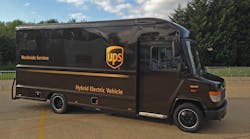UPS Inc. has introduced a new line of range-extended electric vehicles (REEVs) in the United Kingdom that can help overcome existing limitations without cutting into cargo capacity.
The vehicles will be used in Birmingham and Southampton, and can travel up to about 250 miles. They are able to switch between a fully electric mode and a diesel-electric hybrid mode.
Existing vehicles can travel about 62 miles on a single charge. The extended range means UPS can serve these cities with electric vehicles, even though many warehouses are situated beyond the 60-mile range.
UPS has put 15 into its delivery fleets in the two cities. Luke Wake, director automotive engineering and advanced technology with UPS International called the vehicles “a big breakthrough.”
The REEVs use geofencing technology to automatically switch to pure electric mode when reaching a predetermined boundary. The technology also allows the vehicle to switch to the on-board Range Extender that utilizes a smaller and efficient diesel engine to recharge the battery.
The vehicles were developed in conjunction with electric vehicle specialists TEVVA Motors Ltd. are equipped with a 150kW electric motor.
“Commercial vehicles account for 27% of transport related CO2 and 5% of total greenhouse gas emissions on Europe’s roads. EU legislation says that this needs to be cut by 15% by 2025 and 30% by 2030, and Net Zero in the UK by 2050,” said
Richard Lidstone-Scott, commercial director of TEVVA, said European Union and UK regulations required strict reductions in transport emissions means “electrification of the medium-duty truck sector is inevitable, yet many firms and OEMs are still scratching their heads about how and when to make that happen.”
He added: “At TEVVA we already have viable technology… which can help companies like UPS reduce emissions to almost zero without compromising their business-critical ability to carry full payloads.”
UPS ranks No. 1 on the 2019 Fleet Owner 500 listing of the largest for-hire carriers in the United States and Canada.
Since 2009, UPS has invested more than $1 billion in alternative fuel and advanced technology vehicles and fueling stations. It has more than 10,000 alternative fuel vehicles in its global fleet.



